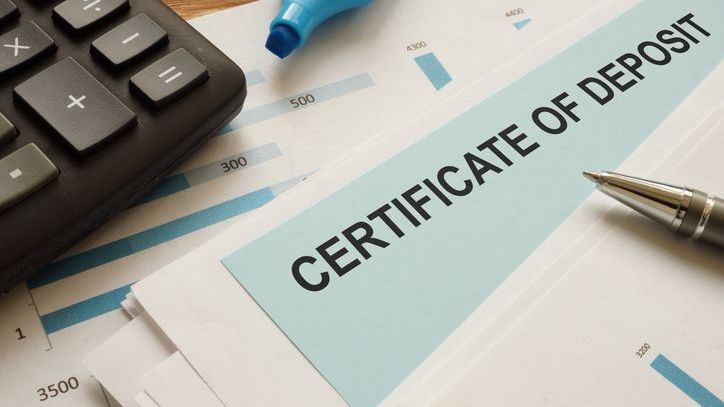Certificates of deposit (CDs) can indeed be donated to charity, offering a unique and impactful way to support your favorite causes. Donating CDs to charity not only provides financial benefits to the organization but can also offer charitable tax deductions for the donor, too.. By transferring ownership of a CD, the charity can cash it out upon maturity, using the funds for their programs and services. This method of giving allows your contribution to grow over time, which can potentially increase the impact of your donation.
If giving money or assets to charity is a priority, consider connecting with a financial advisor to see how they can help you plan your giving.
About Certificates of Deposit (CDs)
Certificates of deposit (CDs) are financial products offered by banks and credit unions. They are essentially savings accounts with a fixed interest rate and a fixed term that can span a couple of months to several years. CDs typically provide higher interest rates when compared with regular savings accounts, making them an attractive option for conservative investors.
When you invest in a CD, you agree to deposit a certain amount of money for a specified period. In exchange, the bank guarantees a fixed interest rate for the term of the CD. When the CD matures at the end of the term you receive your initial investment plus any interest earned. However, withdrawing money from a CD before it matures usually incurs a penalty, which can reduce your overall earnings.
How to Donate CDs to Charity
Donating CDs to charity is possible, but it involves specific steps and considerations. Unlike donating cash or physical goods, transferring ownership of a CD requires careful planning between the financial institution and the charity. Here’s a step-by-step guide to how you can donate your CD to a charitable organization:
1. Check the Terms of Your CD
Before initiating the donation process, review the terms of your CD. Some CDs have restrictions or early withdrawal penalties, which could impact the overall value of your donation. Make sure to understand any potential fees or penalties that might apply.
2. Contact Your Financial Institution
Reach out to the bank or credit union where your CD is held. Inform them of your intention to donate the CD to a charitable organization. They will provide you with the necessary paperwork and guide you through the transfer process. Keep in mind that not all institutions may allow direct transfers of CDs, so this step is important.
3. Select a Qualified Charity

Ensure that the charity you choose is a qualified 501(c)(3) organization. This qualification is necessary for the donation to be tax-deductible. You can verify the status of a charity through the IRS’s Exempt Organizations Search tool.
4. Complete the Transfer
Once you’ve confirmed the terms and selected a charity, work with your financial institution to complete the transfer. This process might involve signing a beneficiary designation form or re-titling the CD in the name of the charity.
5. Obtain a Receipt
After the transfer is complete, request a receipt from the charity. This receipt is important for tax purposes and should detail the value of the CD at the time of the donation.
Tax Implications of Donating CDs to Charity
The interest earned on a CD is subject to federal income tax, and possibly state and local taxes. The IRS taxes the interest in the year it is earned, regardless of whether the interest is withdrawn or left to compound. But donating CDs to charity can offer substantial tax benefits, including deductions and the avoidance of income tax on the money.
Here’s a look at four tax implications of donating a CD to charity:
- Transferring ownership: When you donate a CD, you transfer the ownership of the CD to the charity. The charity becomes the owner of the principal and will receive the interest going forward.
- Tax deduction for donor: As the donor, you may be eligible for a charitable deduction equal to the fair market value of the CD at the time of the donation. This can reduce your taxable income, offering a potential tax benefit.
- Avoidance of interest income tax: By donating the CD before it matures, you may potentially avoid paying taxes on the interest income that would have been earned after the transfer. This can be particularly advantageous if the CD has a high interest rate or if you are in a high tax bracket.
- Charity’s tax-exempt status: Since most charitable organizations are tax-exempt, they will not owe taxes on the interest income from the CD. This means the charity can benefit fully from the interest earned, maximizing the impact of your donation.
When It Makes Sense to Donate a CD
Donating a CD to charity can be a smart move in specific financial situations. One ideal scenario is if you’re nearing or in retirement and find that you don’t need the funds from an older, low-yield CD. Instead of cashing it out, you can gift it to a cause you care about and potentially receive a charitable tax deduction for its current market value.
This strategy can also benefit individuals with large taxable estates. Gifting a CD to charity may help reduce the size of your estate and limit estate tax exposure. Similarly, if you’re having a high-income year — perhaps due to a business sale, bonus, or capital gain — donating a CD can help offset your tax liability by lowering your adjusted gross income through a charitable deduction.
Another smart time to donate is when you hold a CD that’s earning minimal interest and no longer serves your financial goals. Rather than letting it sit idle, transferring ownership to a qualified charity allows the funds to be put to meaningful use. It’s a way to create impact while aligning with long-term financial and philanthropic objectives.
Bottom Line

Incorporating CDs into your charitable giving strategy can not only allow you to make a meaningful contribution but also provide potential tax benefits and support the financial health of the organizations you care about. By carefully planning the donation process and working with your financial institution (or financial advisor) and chosen charity, you can potentially maximize your gift, thereby benefiting both you and the recipients.
Tips for Giving to Charity
- A financial advisor can potentially help you optimize your strategy for charitable giving. Finding a financial advisor doesn’t have to be hard. SmartAsset’s free tool matches you with up to three vetted financial advisors who serve your area, and you can have a free introductory call with your advisor matches to decide which one you feel is right for you. If you’re ready to find an advisor who can help you achieve your financial goals, get started now.
- Of course, donating CDs isn’t the only way to give to charity. Making a qualified charitable distribution (QCD) is another savvy way to give away assets to the causes you care about, while also reaping a tax benefit. A QCD is a tax-free distribution from an IRA made directly to a qualified charity. These withdrawals, which are available to IRA owners who are 70 ½ or older, also count toward your required minimum distributions (RMDs), meaning your RMD won’t count as taxable income.
Photo credit: ©iStock.com/CarmenMurillo, ©iStock.com/Andrii Dodonov, ©iStock.com/zimmytws
